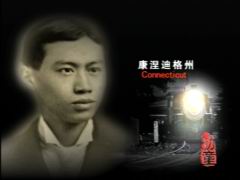Source: CCTV.com
08-14-2006 15:44

In the reign of Emperor Tongzhi, visionaries emerged from the banal and parochial officials. These men realized that the situation in China was like traveling on donkeys while others rode stallions. Those who felt reluctant to ride donkeys aspired to redirect China to a fresh route through unremitting self-strengthening efforts.
“The two Opium Wars taught the Chinese a serious lesson. For the first time they realized that the Westerners could defeat them with their advanced armaments. Now the Chinese became painfully conscious that they were in want of the powerful warships and cannons of the west. They never dreamed that the west had such powerful guns and ships that could defeat them. ”
In 1864, in a letter addressed to the Central Foreign Office, astonishing commentary appeared: 'Chinese gentry scholars are obsessed with diction and syntax only, while the military officers are recklessly uncouth. So what we use is not what we learned, and what we learn won’t be of use to us. In time of peace they mock at foreign machines as a display of wicked craft, while in time of war they demonize the western firearms, which they believe to be beyond their power to learn.'
The person who wrote this letter was Li Hongzhang, who was then Governor of Jiangsu Province. Soon, he, too, would become another key contributor to the overseas student project.
“Li Hongzhang is a major figure in modern Chinese history. He took office as governor of Jiangsu in 1862, and passed away in 1901. For four decades he remained a major player on the political stage of China. He is linked to many great changes in his era.”
In fighting the Taiping Heavenly Kingdom Rebellion Zeng Guofan promoted Li Hongzhang's political debut. Li started out by training the Huai Army in his home province of Anhui. Later he became the backbone of the so-called "Westernization Officials."
“Li's professional achievements and advancement illustrated the benefits of modern technology and the modern military industry.”
Beginning in the 1860s, a number of cities in China began to see things they had never seen before.
The Westernization Officials began to develop their own students. In 1867 at the Ding Guang Temple in Fuzhou City were heard a dozen children reading aloud 'A, B, C, D'. This was the Foochow Shipbuilding College founded by Zuo Zongtang and Shen Baozhen. Westernized education was the order of the day at the college. Teachers were from France and England, countries famous for their advanced techniques of ship-building and navigation. The modern thinker Yan Fu and marine officers like Liu Buchan, Deng Shichang, Lin Tai Zeng, were all graduates of this school. Fourteen years later, Rong Hong's young students would come here.
However, the traditional Chinese educational system was not to be reversed. The Westernization Officials opened Tongwen College in Beijing. They recruited foreign teachers and offered courses in western studies. The school authority decided to enroll successful candidates of the imperial examination. This decision ignited universal controversy. What a shame to allow court-appointed officials to learn from foreigners! A censor (took the lead in maligning it. He advocated self-reliance as of the utmost importance. And the crux of self-reliance lay in the Emperor's subjects' integrity and faith, cultivated by the Way of Yao, Shun, Confucius and Mencius. Such integrity would shelter the Chinese from any ill fate or enemy. He) attacked the Tongwen College as a traitorous institution that promoted submission to 'barbarian' culture through its educational reforms. He claimed that turning from tradition would subject the Chinese to foreign influences and would end up in the loss of the nation's identity.
In the spring of 1865, after spending over a year in America, Rong Hong shipped the machinery he had purchased to China, to the factory at the Kiang Nan Arsenal. When Zeng Guofan visited it, Rong Hong grabbed the chance.
“I suggested to him that he establish a military industrial school near the factory to train Chinese students, so that in future China would not have to depend on foreign machines and engineers.”
Zeng Guofan approved this scheme, and soon the school was founded. Rong Hong said this success was but an initial step in his grand project.
By 1867, already twelve years in China, Rong Hong was still waiting for the right time to come. In that year, the Qing Court appointed, Anson Burlingame, China’s first envoy to the west, which shed light on Rong Hong's plan.

